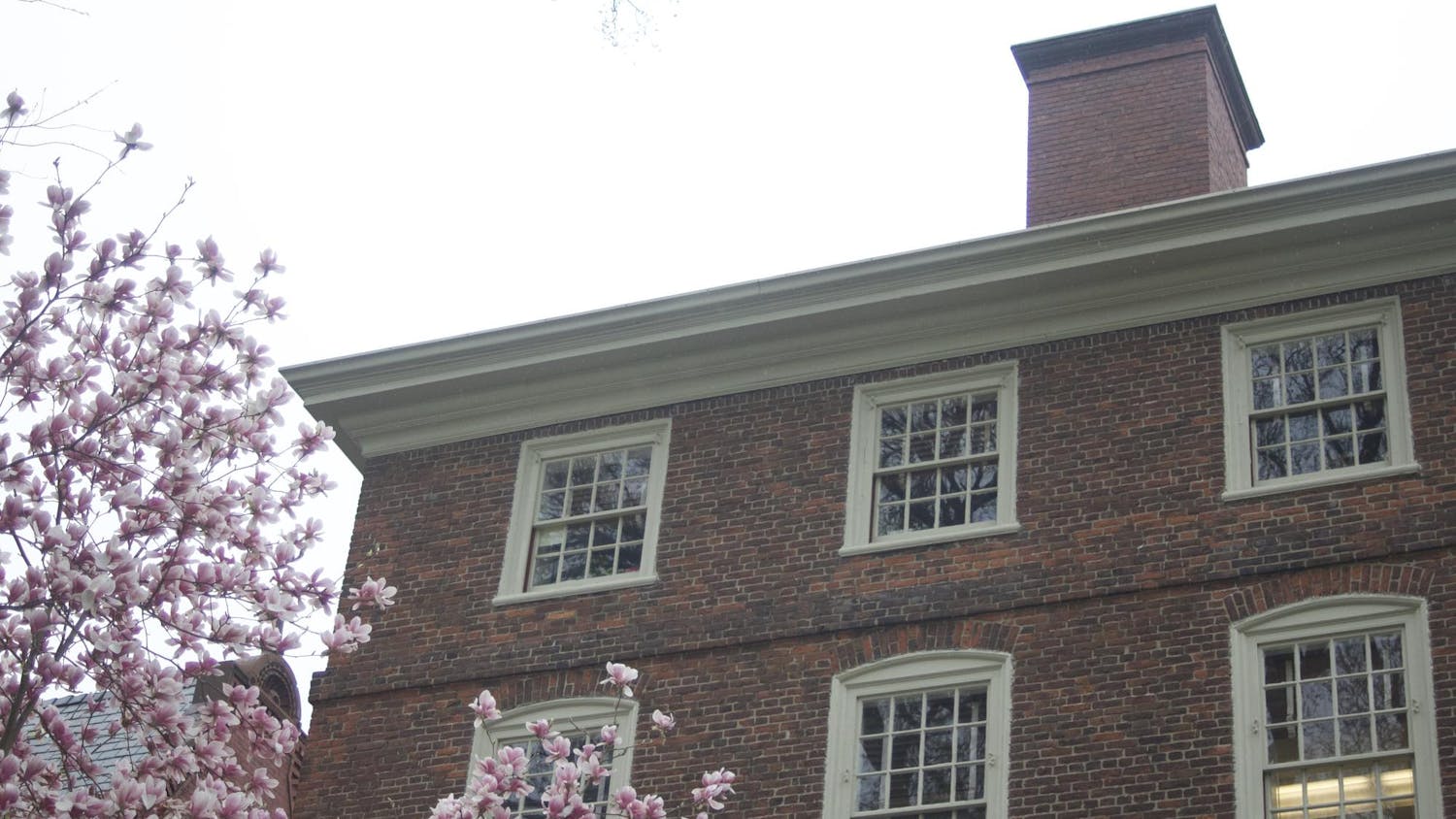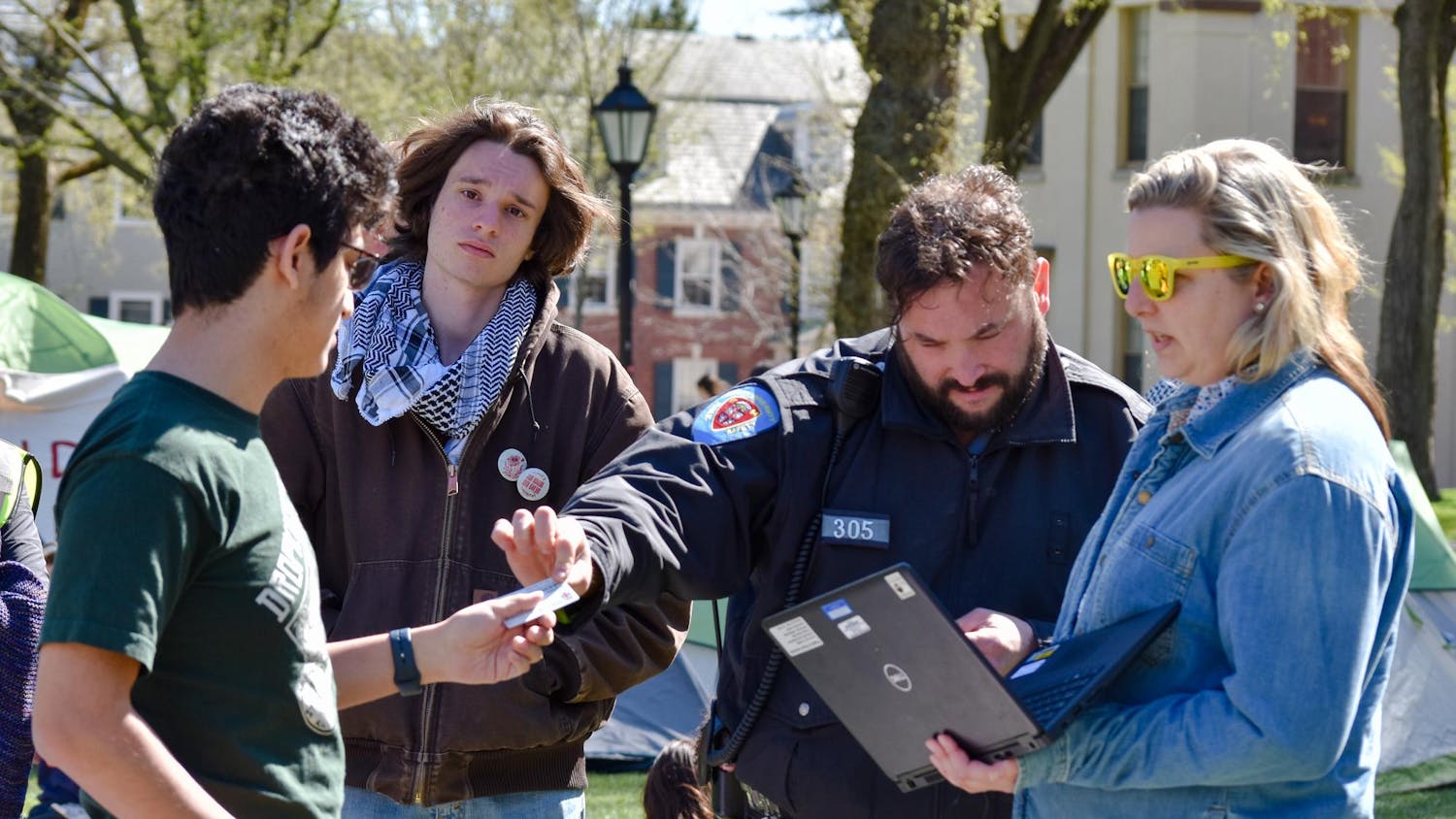Christina Paxson, dean of Princeton's Woodrow Wilson School of Public and International Affairs and a prize-winning economist, will serve as the next University president. The Corporation elected Paxson the 19th president in a special session Friday morning.
"There was a sense from the first time we met her that she had a deep appreciation for the Brown culture and community," said Thomas Tisch '76, chair of the Presidential Search Committee and chancellor of the Corporation.
Corporation Vice-Chair Jerome Vascellaro '74 P'07 said Paxson was chosen in part for her "relentless pursuit of quality," her "devotion to academic excellence" and her embodiment of the blend between teaching and research.
Paxson, who was chosen by the Presidential Search Committee and the Campus Advisory Committee formed after President Ruth Simmons announced her intent to step down in September, will begin her term July 1.
The perfect fit
In an interview with The Herald, Paxson said Brown seemed like a "wonderful fit" based on its "values, character and spirit."
"I loved my time at Princeton, but I find the Brown character to be very appealing," she said. In particular, she cited Brown's university-college model as admirable, noting that she received her bachelor's degree from Swarthmore College, also a small liberal arts institution.
"One of the goals of Brown is to continue to grow as a first-class research institute" while maintaining a focus on undergraduates, she said.
She also emphasized the necessity to ensure that Brown remains on a sound financial footing.
"That's one of the most important jobs of the president," she said, "so I am looking forward to doing that."
Paxson will face financial pressures on two fronts — balancing the University's support for Providence and keeping tuition affordable — when she arrives, Simmons said.
"I think she has a very good sense of Brown and the unique institution that it is, and she will fight to protect that," Simmons said.
Provost Mark Schlissel P'15, who was not involved in the search process, called Paxson a "a consensus-builder and a very inclusive decision-maker."
Paxson expressed interest in launching additional fundraising campaigns, citing the success of the Campaign for Academic Enrichment and the fundraising opportunity that will accompany the University's upcoming 250th anniversary.
"I would love to be able to go loan-free. I would love to increase support for international students," she said, citing the University's increasing tuition as a "major concern."
Paxson said her upcoming presidency also marks a point for the University to reflect upon what it has achieved and to think about what comes next.
"It's an opportunity for reshaping or at least investigating if reshaping is needed," she said. "I expect that will be something I focus on my first year."
From the outside in
Chung-I Tan P'95 P'03, chair of the Campus Advisory Committee and professor of physics, told The Herald that Paxson's main challenge will stem from her current status as a University outsider.
"There will be a learning curve," he said.
Paxson said she will need time to grow acquainted with the University's senior staff, as well as its community, before she sets any specific agenda. Implementing initiatives she developed at Princeton, she added, would likely be an ineffective leadership strategy. "What develops here has to come from here," she said.
Paxson, whose brother attended Brown, acknowledged the differences that exist between Brown and Princeton, noting that her background in health and wellness will be especially helpful at Brown. Princeton does not have a school of public health or a school of medicine.
The University has been working to establish a school of public health at Brown, though no such school has yet been approved. The Alpert Medical School, re-launched in the 1970s, recently underwent a major expansion, moving to new facilities in the Jewelry District last year.
"I'm excited to be at an institution that has both of those programs, and I do think that Rhode Island is an interesting place," she said. "We're in for a very interesting period with the introduction of the Affordable Care Act, and there's a lot of uncertainty about how that will play out. But it's exciting that Brown will be able to be a part of that in the next two to five to 10 years."
Finding a successor
The presidential search committees first learned about Paxson from the husband of one of the Corporation's trustees, Tisch said. She was also identified by Spencer Stuart, the search firm the Corporation employed, as a "great star" in higher education, he said.
The committees had broad lists at the end of December, but they zeroed in on top-tier candidates in the past two months.
"She was appreciated all the way through," Tisch said. "Like any great relationship, it just grew."
The full committees met in New York last week to determine a final recommendation. Though Tisch said it was "obvious" by Monday night that Paxson would be named, the groups reconvened Tuesday morning to make their final decision.
While Paxson's international relations experience intrigued the committees, Tisch said there was no defining criterion that determined their selection. Rather, he said, the committee evaluated the candidates holistically.
"There's a certain something intangible about her," Tan said. "She just feels right."
Paxson said following Simmons' tenure is particularly exciting, adding that she has "so much respect for Ruth."
"I think it's an advantage to come into an institution after a strong leader," she said, adding that Simmons' presidency has left the University in a strong position.
Given that strength, Paxson said one of the challenges of her tenure will be prioritizing "where to grow and how to grow."
"Ruth Simmons has done a terrific job building in a way that leaves it without a clear problem in any area," Paxson said.
Simmons was named in 2001 as the first black president of an Ivy League institution. Cornerstones of her presidency have included the Plan for Academic Enrichment, a roadmap for the University's academic development, and the Campaign for Academic Enrichment, the largest fundraising campaign in the University's history.
Simmons also introduced need-blind admission to the University and presided over the creation of the School of Engineering. A Herald poll last fall reported that 68.2 percent of students approve of Simmons' job performance.
Currently, Simmons is in the process of negotiating how much money the University will contribute to Providence. Simmons has expressed hope the negotiations will conclude before her term ends.
Since the outcome of talks with the city government is still unclear, Paxson said she could not comment on how she will handle the situation after assuming the presidency.
Paxson, a history
Paxson graduated from Swarthmore College and received her masters degree and PhD from Columbia.
After being named dean of the Woodrow Wilson School in 2009, Paxson was praised in an editorial in the Daily Princetonian for her emphasis on multidisciplinary studies and for seeking to bridge divides between the studies of international and domestic policy.
The Woodrow Wilson School is
currently undergoing curricular redevelopment, the Daily Princetonian reported last month. It will now require students to take new prerequisite courses as part of an attempt to make the major more interdisciplinary. Tisch said a "great concern" for the committee had been whether Paxson would be ready to leave Princeton as the Woodrow Wilson School undergoes its changes.
"Fortunately, Christina came to the conclusion that this was both the right fit for her and also that the work that had been put in place at Woodrow Wilson could be carried on without her being present," he said.
Paxson said she will be sad to not see the school's curricular development "come to fruition." But she said the "terrific faculty and staff" there leave her confident changes will progress smoothly after she leaves.
"The opportunity at Brown was just so wonderful," she said. "That was not going to prevent me from moving."
While dean, Paxson ended selective admissions to the Woodrow Wilson School. Until then, the school was the only part of Princeton that undergraduates had to be admitted to specifically, the Daily Princetonian reported.
In 2006, Paxson attracted media attention when she co-authored a study arguing that tall people earn more money because they possess superior cognitive abilities.
As a professor of economics and public affairs whose research focuses on children's health, Paxson founded Princeton's Center for Health and Wellbeing and served as the inaugural director of the school's National Institute on Aging Center for the Economics and Demography of Aging. She also currently sits on the Council on Foreign Relations.
Paxson's experience with international affairs will enable her to be a "great spokesperson" on the importance of making Brown a global institution, Simmons told The Herald.
Though she has yet to work out specifics, Paxson said she is particularly interested in strengthening the University on the international front, looking at "health issues" and creating "strong interdisciplinary programs."
Paxson will be visiting campus regularly throughout the spring to learn about campus issues, Simmons told The Herald.
"Going forward with President Paxson, I think we are entering a truly exciting era of Brown's history," said Susan Harvey, professor of religious studies and a member of the Campus Advisor Committee.
— With additional reporting by Elizabeth Carr, Lucy Feldman, Sahil Luthra and Margaret Nickens




